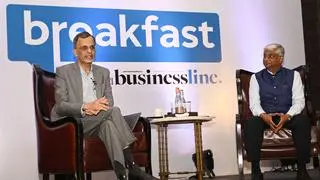With the October 1 deadline for implementation of the transition phase of EU’s Carbon Border Adjustment Mechanism (CBAM) just round the corner, India, South Africa and some other developing nations are trying to put up a joint front at the World Trade Organization (WTO) to challenge the measure and buy more time for complying with emission reporting norms for exports of carbon-intensive products such as steel, aluminium and cement to the bloc, officials have said.
“We are strongly trying to postpone implementation of the CBAM till there is clarity on its WTO compatibility. The principles of common but differentiated responsibility (CBDR), which is also part of the Paris Agreement on climate change, as well as the provision on Special & Differential Treatment (S&DT) for developing countries, are clearly being violated. India, South Africa and many other developing nations, along with least developed countries (LDCs) are joining forces at the WTO to persuade the EU to slow things down till obligations are more clear,” an official tracking the matter told businessline.
The CBAM aims to put a price on carbon emitted during the production of certain items identified as carbon-intensive when they are imported into the bloc. This will be in the form of higher import levies which are to be applicable from 2026. To begin with, it will apply on cement, iron and steel, aluminium, fertilizers, electricity and hydrogen.
In India, the hardest hit sectors could be iron & steel and aluminium, which may end up paying 20-35 per cent additional import levies, per a report by Delhi-based research body, Global Trade Research Initiative. Last year, as much as 27 per cent exports of iron, steel and aluminium products, valued at $8.2 billion, were shipped to the EU, the report said.
“While India has to come up with a strategy to avoid the carbon taxes and is already in talks with the EU on recognition of its own carbon credit certification system, which is in the works, the bigger problem at the moment is negotiating the October 1 deadline for the transition phase,” the official said.
From October 1, exporters of the CBAM list of items will need to keep a record of their total embedded green house gas emissions which are to be calculated and verified under the regulation. “While the government is conducting workshops with the industry on the regulation, it is a complicated process and without more clarity on rule, flexibilities and greater transition time, may be difficult to follow,” the official said.
The EU’s argument justifying the CBAM is that it is a levy on their imports corresponding to the charge imposed on comparable domestic industries under the EU ETS (Emission Trading System), thus creating a level playing field and checking ‘carbon leakage’.
India has already sought exemption for its MSME sector from CBAM in its bilateral discussions with the EU but it has been insisting that the whole objective of reducing carbon emissions with a target in mind would become redundant with exemptions, the official said.
“To begin with, at least whatever the EU has done for its own MSMEs, in terms of extra transition period, should also be extended to Indian MSMEs,” the official said.








Comments
Comments have to be in English, and in full sentences. They cannot be abusive or personal. Please abide by our community guidelines for posting your comments.
We have migrated to a new commenting platform. If you are already a registered user of TheHindu Businessline and logged in, you may continue to engage with our articles. If you do not have an account please register and login to post comments. Users can access their older comments by logging into their accounts on Vuukle.